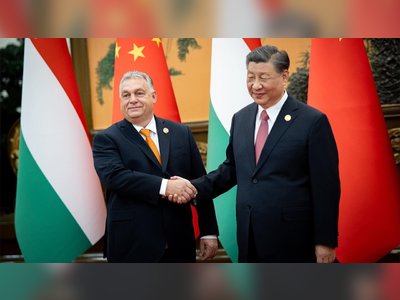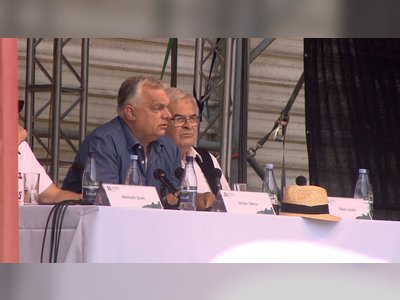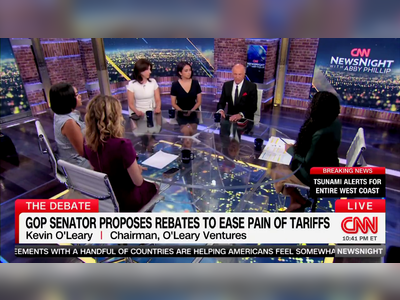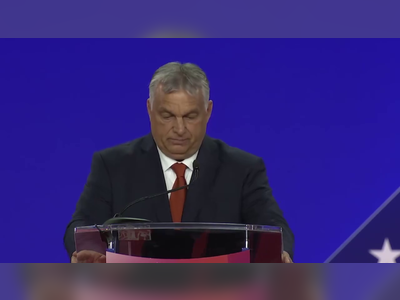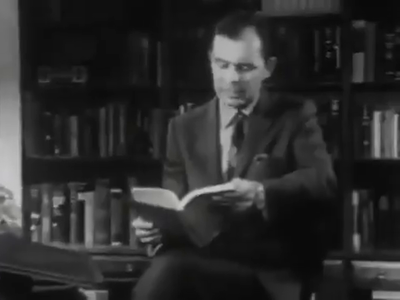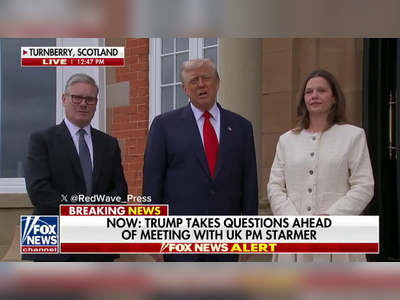Orbán Viktor Discusses International Relations and the Path to Peace in Ukraine
In a recent interview, Hungarian Prime Minister Viktor Orbán outlined his views on global politics, the influence of prominent financiers, and the complexities of the ongoing Russia-Ukraine conflict.
Hungarian Prime Minister Viktor Orbán shared his perspectives on various political topics in a recent interview with American commentator Ben Shapiro, released on his YouTube channel.
The discussion, which lasted nearly thirty minutes, covered a range of issues pertinent to Orbán’s political narrative, including his impact on global politics, his political career, his confrontation with financier George Soros, the role of the European Union, and the ongoing war in Ukraine.
Orbán emphasized the value of political polarization in democracy, arguing that differing opinions are necessary for meaningful discussion and resolution.
He articulated that ultimately, consensus must be reached for the sake of governance, peace, and public welfare.
Referring to his presence in the United States, he noted that media portrayals often depict him negatively, particularly highlighting his stance against migration during the crisis of 2015-2016 when he called for stricter border controls in Hungary.
In his comparisons of himself to Soros, Orbán stated that the only commonality they share is their Hungarian origin.
He described their animosity as resembling a sporting event, suggesting that Soros has evolved beyond the political landscape of Hungary to become a significant global financial player.
Orbán proceeded to label the ongoing ideological struggle as one between conservative patriots on one side and left-wing progressives on the other, critiquing the latter for seeking to transcend traditional values tied to nationalism, religion, and cultural heritage.
Orbán expressed bemusement at accusations questioning his democratic credentials, positioning himself as a defender of democracy who has fought for freedom and governance in Central Europe.
He reflected on his lengthy tenure in opposition and governance, suggesting that criticism of his regime is a reflection of his role as a challenge to the international left.
The discussion shifted to the political influence of modern social media figures, with Orbán placing Shapiro in what he termed a 'grey zone' where new pressures on political discourse can emerge from outside traditional institutions.
He remarked on the importance of tracing financial flows to comprehend political actions and highlighted the complexity of ensuring transparency amidst perceived manipulation by progressive forces.
Orbán characterized Brussels as a puzzling entity for outsiders and maintained that the character of the European Union has evolved since its founding, increasingly infringing on the sovereignty of nation-states.
He argued that while the EU’s original purpose was to promote peace and cooperation among member states, it has morphed into a central power that seeks to undermine national governance.
Regarding the ongoing conflict between Russia and Ukraine, Orbán referred to a narrative often echoed by Russian officials, positing that Western integration efforts have provoked Russian hostility.
He claimed that the situation deteriorated under President Joe Biden's administration, glossing over the fact that the initial aggression in 2014 occurred during President Barack Obama’s tenure.
Orbán expressed skepticism about the efficacy of direct negotiations between Russia and Ukraine, drawing on his experience as a mediator during Hungary's EU presidency.
He asserted that genuine peace would depend on direct negotiations between the United States and Russia, suggesting that the inclusion of Ukraine in such discussions is secondary.
Furthermore, he warned that Ukraine's potential EU membership would not only politicize the ongoing conflict but also precipitate a shift towards federalism within Europe, potentially undermining national sovereignty in favor of an overarching European governance model.
He argued that the ongoing support for Ukraine from the EU budget exacerbates Hungary's financial challenges while diverting resources from domestic priorities.
Orbán stressed the need for European nations to maintain their sovereignty amidst external pressures and warned against the increasing tide of centralization exemplified by the Union's response to contemporary crises.
He noted a pattern where crises lead to a consolidation of power in Brussels at the expense of member states, a trend he implores fellow leaders to address proactively.
The discussion, which lasted nearly thirty minutes, covered a range of issues pertinent to Orbán’s political narrative, including his impact on global politics, his political career, his confrontation with financier George Soros, the role of the European Union, and the ongoing war in Ukraine.
Orbán emphasized the value of political polarization in democracy, arguing that differing opinions are necessary for meaningful discussion and resolution.
He articulated that ultimately, consensus must be reached for the sake of governance, peace, and public welfare.
Referring to his presence in the United States, he noted that media portrayals often depict him negatively, particularly highlighting his stance against migration during the crisis of 2015-2016 when he called for stricter border controls in Hungary.
In his comparisons of himself to Soros, Orbán stated that the only commonality they share is their Hungarian origin.
He described their animosity as resembling a sporting event, suggesting that Soros has evolved beyond the political landscape of Hungary to become a significant global financial player.
Orbán proceeded to label the ongoing ideological struggle as one between conservative patriots on one side and left-wing progressives on the other, critiquing the latter for seeking to transcend traditional values tied to nationalism, religion, and cultural heritage.
Orbán expressed bemusement at accusations questioning his democratic credentials, positioning himself as a defender of democracy who has fought for freedom and governance in Central Europe.
He reflected on his lengthy tenure in opposition and governance, suggesting that criticism of his regime is a reflection of his role as a challenge to the international left.
The discussion shifted to the political influence of modern social media figures, with Orbán placing Shapiro in what he termed a 'grey zone' where new pressures on political discourse can emerge from outside traditional institutions.
He remarked on the importance of tracing financial flows to comprehend political actions and highlighted the complexity of ensuring transparency amidst perceived manipulation by progressive forces.
Orbán characterized Brussels as a puzzling entity for outsiders and maintained that the character of the European Union has evolved since its founding, increasingly infringing on the sovereignty of nation-states.
He argued that while the EU’s original purpose was to promote peace and cooperation among member states, it has morphed into a central power that seeks to undermine national governance.
Regarding the ongoing conflict between Russia and Ukraine, Orbán referred to a narrative often echoed by Russian officials, positing that Western integration efforts have provoked Russian hostility.
He claimed that the situation deteriorated under President Joe Biden's administration, glossing over the fact that the initial aggression in 2014 occurred during President Barack Obama’s tenure.
Orbán expressed skepticism about the efficacy of direct negotiations between Russia and Ukraine, drawing on his experience as a mediator during Hungary's EU presidency.
He asserted that genuine peace would depend on direct negotiations between the United States and Russia, suggesting that the inclusion of Ukraine in such discussions is secondary.
Furthermore, he warned that Ukraine's potential EU membership would not only politicize the ongoing conflict but also precipitate a shift towards federalism within Europe, potentially undermining national sovereignty in favor of an overarching European governance model.
He argued that the ongoing support for Ukraine from the EU budget exacerbates Hungary's financial challenges while diverting resources from domestic priorities.
Orbán stressed the need for European nations to maintain their sovereignty amidst external pressures and warned against the increasing tide of centralization exemplified by the Union's response to contemporary crises.
He noted a pattern where crises lead to a consolidation of power in Brussels at the expense of member states, a trend he implores fellow leaders to address proactively.
AI Disclaimer: An advanced artificial intelligence (AI) system generated the content of this page on its own. This innovative technology conducts extensive research from a variety of reliable sources, performs rigorous fact-checking and verification, cleans up and balances biased or manipulated content, and presents a minimal factual summary that is just enough yet essential for you to function as an informed and educated citizen. Please keep in mind, however, that this system is an evolving technology, and as a result, the article may contain accidental inaccuracies or errors. We urge you to help us improve our site by reporting any inaccuracies you find using the "Contact Us" link at the bottom of this page. Your helpful feedback helps us improve our system and deliver more precise content. When you find an article of interest here, please look for the full and extensive coverage of this topic in traditional news sources, as they are written by professional journalists that we try to support, not replace. We appreciate your understanding and assistance.


